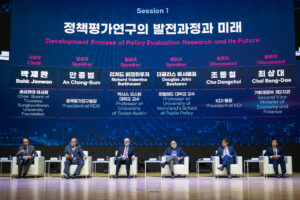Session 1 : Development Process of Policy Evaluation Research and Its Future

SPEAKERS
Chong-bum An(President of PERI)
<“The Development of Policy Evaluation Research and Tasks for Policy Reform”>
▸Analyzing the problems of policy evaluation in Korea and suggesting ways to build a policy evaluation system
▸Establishment of data infrastructure and development of evaluation methods for pre- and post-policy evaluation
▸For fundamental policy evaluation system reform, it is important to make the National Assembly Preliminary Committee a standing committee and dramatically improve national audit.
ㅇRichard Burkhauser (Senior Research Fellow at Civitas Institute)
<“The Development of Policy Evaluation Research and the Role of Policy Research Institutions”>
▸Pointed out the importance of evidence-based policy-making for Korea
▸In the case of the U.S., legislation on evidence-based policymaking was enacted in 2018
▸Scientific policy evaluation research using data will play a big role in the future
ㅇDouglas Besharov (Professor at University of Maryland’s School of Public Policy)
<“The Five Pillars of Evidence-Based Policy Analysis: Implications for Korean Decision Makers”>
▸Five tips for evidence-based policymaking in Korea
▸Build a model, systematically monitor, implement and operate, assess realistic spillover effects, revisit and improve policies, and make ethical decisions in an uncertain environment
DISCUSSION HIGHLIGHTS
Chair: Jae-wan Bahk (Chair, Board of Trustees, Sungkyunkwan University Foundation/Former Minister of Economy and Finance)
Discussant:
Dong-chul Cho (President of KDI/Former Member of Monetary Policy Committee of Bank of Korea)
Sang-dae Choi (2nd Vice Minister of Economy and Finance/ Former Director of Budget Office of Ministry of Economy and Finance)
ㅇ Dong-chul Cho (President of KDI/Former Member of Monetary Policy Committee of Bank of Korea)
– Three aspects of policy evaluation should be emphasized: professionalism, neutrality, and access to data. In terms of expertise, it is difficult for public officials to accumulate expertise in one field due to rotating positions. This is why think tanks like the KDI play an important role.
– In terms of neutrality, due to the political environment, policy environment, and media environment, it is difficult for public sector think tanks such as the KDI to be neutral due to governance.
– Data accessibility is also important. In particular, the government accumulates a lot of administrative data. They have various administrative information such as health insurance, taxes, and welfare systems, but privacy issues are a challenge. The KDI has recently said that it is necessary to provide researchers with data on the premise of policy development and policy evaluation by compensating for privacy issues, and the KDI is also trying to establish such a system.
ㅇ Sang-dae Choi (2nd Vice Minister of Economy and Finance/ Former Director of Budget Office of Ministry of Economy and Finance)
– (Conducting evidence-based evaluation through performance feedback) The performance evaluation system is complicated and not well understood by the public. A data-based performance management system based on performance targets and performance indicators should be established centered on core fiscal projects.
– (Problem of policy evaluation and actual policy choice) Rational policy evaluation results may not necessarily lead to final policy choices. The fiscal discipline legislation is being promoted, and while it is certainly urgent and reasonable, it is not being handled by the National Assembly due to misunderstanding and intentional misunderstanding. In particular, the sharp increase in the minimum wage under the income-led growth policy was implemented even though there were many economic and policy problems, resulting in a negative impact on employment and excessive fiscal expenditure.
– (Need for data-driven private policy evaluation organizations) In order for evidence-based, performance-based, and rational policy evaluation to lead to policy choices, disclosure of administrative data and rational analysis are important. A reputable policy research institute that can provide objective and rational analysis to the government and build social consensus is needed to establish a virtuous cycle of performance-based and evidence-based policy evaluation and policy formulation based on the results.
<PERI, Policy Evaluation Research Institute>


